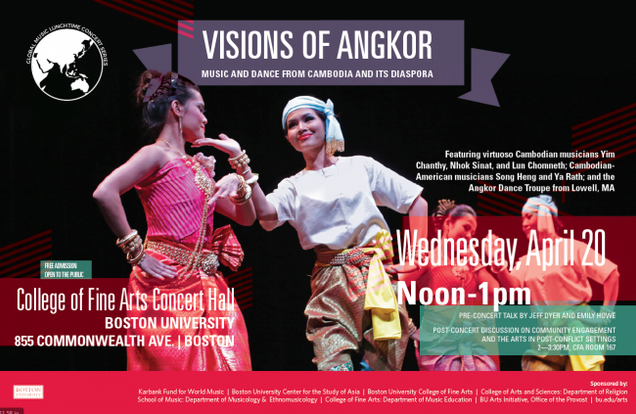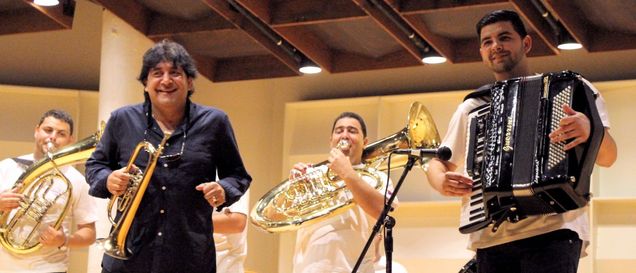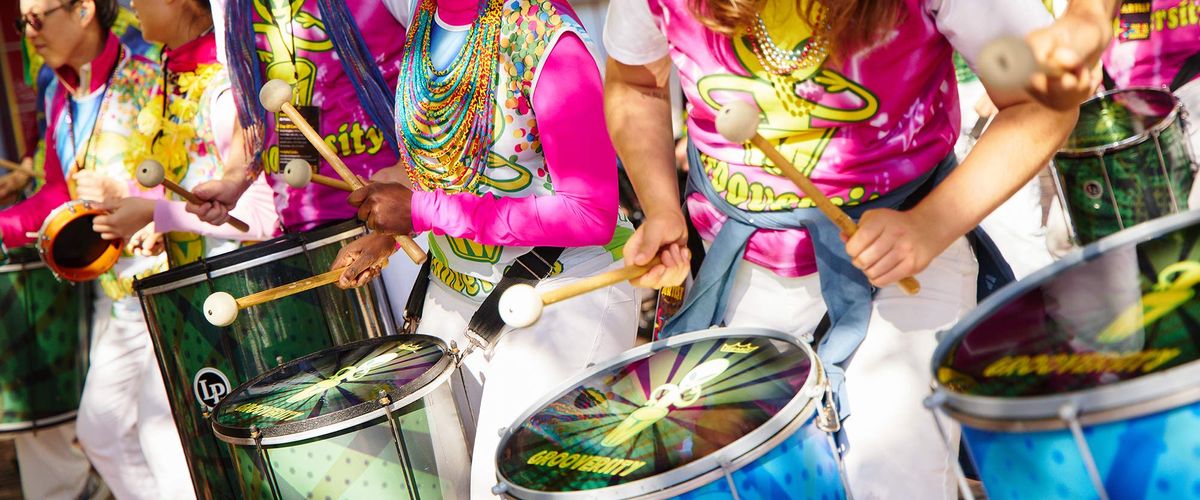2022 BU GLOBAL MUSIC FESTIVAL
BU Global Music Festival is an all-day outdoor event that brings together extraordinary international music, educational events, and a global bazaar at Boston University – all free and open to the public.
Supported in part by an award from the National Endowment for the Arts, the festival is produced by the BU Arts Initiative – Office of the Provost and the Department of Musicology & Ethnomusicology in the College of Fine Arts School of Music, with additional support from Boston University College of Fine Arts, Boston University Dean of Students Office, The Jewish Cultural Endowment at BU, College of Arts and Sciences World Languages & Literatures Program, and BU Global House.
Global Music Lunchtime Concert Series
The Global Music Lunchtime Concert Series, organized by the Department of Musicology and Ethnomusicology, showcases musicians, dancers, and performing artists seeped in popular, folkloric, and vernacular traditions from around the world. The series aims to provide students and faculty with opportunities to explore diverse musical practices from the world over. Accompanied by lectures or workshops whenever possible, this concert series will offer the audience intellectual insights and hands-on experiences in selected performing arts from various parts of the globe. Sponsored by the School of Music, College of Fine Arts, and BU Arts Initiative, Office of the Provost.
2016/2017

MUSIC AND DANCE FROM CAMBODIA AND ITS DIASPORA
Featuring Lun Phanith, Nhok Sinat, Yim Chanthy (Cambodia) and the Angkor Dance Troupe (Lowell, MA)
PANEL DISCUSSION: COMMUNITY ENGAGEMENT AND THE ARTS IN POST-CONFLICT SETTINGS
Panelists: George Chigas (University of Massachusetts, Lowell); Erica Haskell (University of New Haven); Song Heng (Cranston, RI); Ya Rath (Lowell, MA); Johannah Segarich (Middlesex Community College)
At the concert, Cambodian virtuoso musicians Lun Phanith, Nhok Sinat, and Yim Chanthy will perform music and dance drawn from classical, folk, wedding, and Buddhist ritual repertories. The Lowell, MA-based Angkor Dance Troupe will perform Cambodian folk and classical dance. Providing an opportunity for these talented young Cambodian musicians and Cambodian-American dancers to collaborate in Boston, our goal is to help build energy around the global resurgence of Cambodian arts. Don’t miss this opportunity to witness Cambodian arts at their finest!
At the post-concert panel discussion, Cambodian and Cambodian-American musicians will dialogue with community leaders and scholars about their wide-ranging experiences practicing, teaching, and advocating for Cambodian arts in varied contexts. Exploring issues of memory, heritage, and the arts in post-conflict societies and among people living in diaspora, we first aim to highlight the voices and experiences of Cambodian people who have historically been silenced and marginalized by war, genocide, and economic hardship. We then seek to understand how the policies and priorities of institutions such as schools, universities, nonprofit organizations, the government, and granting agencies interact in the development of Cambodian arts sectors in Cambodia and in diaspora.
Sponsored by:
- Karbank Fund for World Music
- Department of Musicology & Ethnomusicology, School of Music (CFA)
- Cinema & Media Studies (COM)
- African Studies Center (CAS)
- Department of Anthropology (CAS)
- BU Arts Initiative, Office of the Provost
2014/2015

BOBAN I MARKO MARKOVIC ORKESTAR: Cutting Edge Gypsy Brass Band from Serbia
October 8, 2014
Pre-concert talk by Adriana Helbig, ethnomusicologist (University of Pittsburgh)
Ancient melodies that have worked their way down the Silk Road to the beaches of the Adriatic Sea, played on the instruments of 19th-century Czech military bands over the throbbing Roma rhythms that have powered wild dances and celebrations for centuries—this is Balkan brass band music. The dynamic father and son trumpet duo has been celebrated as the ambassadors of this tradition, winning many titles at the globally recognized annual brass festival in the Serbian town of Guča. Since 1961, the small town of Guca in Central Serbia has been the venue for the annual “Festival of Brass Music”, a competition to determine the best Brass musicians on Earth, attracting over 300.000 people every year. The Boban Markovic Orkestar used to be among the winners every time, receiving the “best orchestra” award in 2000 as well as “best trumpet” for the maestro himself in 2001—his 5th personal win. Since then, Boban decided not to compete any more, but simply performs as an honored guest. He’s the undisputed King of Balkan Brass music.

THE NILE PROJECT
One-week residency at Boston University, March 23-27 2015
The Nile Project was conceived by Egyptian ethnomusicologist Mina Girgis and Ethiopian American singer Meklit Hadero in 2011. Their main mission is to “educate, inspire, and empower the citizens of the Nile basin to foster the sustainability of the Nile River’s ecosystem.” The main component of the project is music; they are working to approach the issues of water politics and cultural conflict in the area through musical collaboration among musicians from all the countries that border the Nile River. Much of the project takes place in North Africa (they held their first meeting and concert in Cairo and Aswan last year, and they just had their installment in Uganda this summer), but the musicians will be touring through the US to share the fruit of their 3-year long collaboration at universities as well as the Lincoln Center and the Smithsonian Institute in 2015-2016.
During the 5-day residency at BU, the artists will be offering class visits, workshops, film screening, a matinee concert for school aged children from the Boston area, and a final public performance through a partnership with World Music/CrashArts. There will also be panel discussions around relevant issues such as water politics in the Nile Basin, and music and social engagement.
The course MH344 A1 “Music and Society: Sound, Music, and Ecology” has been specially designed to integrate the residency into the curriculum.
Sponsored by:
- Department of Musicology and Ethnomusicology, School of Music
- College of Fine Arts
- BU Arts Initiative, Office of the Provost
- African Studies Center
- Pardee Center for the Study of the Longer-Range Future
- Middle Eastern and North African Program
- Departmnet of Music Education
- BU African Student Organization
- Global Programs
- BU Sustainability
- World Music/CrashArts
- New England Foundation for the Arts
2013/2014
DHAKABRAKHA: Ukrainian World Music Quartet
October 9, 2013
Co-sponsored by the Center for the Study of Europe, BU Arts Initiative-Office of the Provost
PRE-CONCERT LECTURE: Prof. Maria Sonevytsky (University of Toronto)
DhakaBrakha is a world music quartet from Kiev, Ukraine. Reflecting on the fundamental elements of sound and soul, Ukrainian “ethno chaos” band DakhaBrakha creates a world of unexpected new music. Having experimented with Ukrainian folk music, the band has added rhythms of the surrounding world into their music, thus creating a bright, unique and unforgettable soundscape. They have revealed the potential of Ukrainian melodies and brought it to the hearts and minds of the younger generation in Ukraine, as well as the rest of the world. Using Indian, Arabic, African, Russian and Australian traditional instrumentation, the quartet’s astonishingly powerful and uncompromising vocal range creates a trans-national sound rooted in Ukrainian culture.

VIEUX FARKA TOURE: “The Hendrix of the Sahara”
October 23, 2013
Co-sponsored by the African Studies Center, BU Arts Initiative-Office of the Provost
PRE-CONCERT LECTURE: Prof. Ingrid Monson (Harvard University)
Often referred to as “The Hendrix of the Sahara”, Vieux Farka Toure was born in Niafunké, Mali in 1981. He is the son of legendary Malian guitar player Ali Farka Toure, who died in 2006. Ali Farka Touré came from a historical tribe of soldiers, and defied his parents in becoming a musician. When Vieux was in his teens, he declared that he also wanted to be a musician. His father disapproved due to the pressures he had experienced being a musician. Rather, he wanted Vieux to become a soldier. But with help from family friend the kora maestro Toumani Diabaté, Vieux eventually convinced his father to give him his blessing to become a musician shortly before Ali passed.
RED BARAAT: Bhangra Funk Dhol ‘n Brass
April 14, 2014
Pre-concert talk by Prof. Shalini Ayyagari (American University)
Co-sponsored by Global India Initatives, Center for the Study of Asia, and the BU Arts Initiative
Red Baraat is wild — and loud. It’s also a genre unto itself. The Brooklyn ensemble self-identifies as “dhol ‘n’ brass,” a hybrid of Indian bhangra, contemporary Indian dance music that mixes Punjabi folk beats with popular contemporary genres, and New Orleans brass band music. One of the best party bands around, Brooklyn-based 8-piece band Red Baarat plays rollicking funk music steeped in Northern India’s wedding celebrations with a dash of D.C. go-go beats, brass funk, and hip-hop. Red Baraat has performed at the White House, the flagship TED Conference in 2012, Google’s Mountain View Campus, and closed the London 2012 Paralympic Games. But even as it’s clear that Red Baraat is building a startling history of performances in iconic settings, the band’s bread and butter remains the sweaty clubs, festivals, packed performing arts centers, and college auditoriums that have kept the band on the road all over the world for nearly 200 dates a year. It’s here where the band does what it does best- communing with their audience in a joyful, near hedonistic celebration of music and dance, which tellingly, draws a crowd even more diverse than the players on stage.
Red Baraat was joined on stage by BU’s own award-winning student bhangra group, BU Bhangra.
2011/2012
ELIYAHU & THE QADIM ENSEMBLE: Sacred & Folkloric Music of the Near East
February 15, 2012
Qadim is a word found in both Arabic and Hebrew meaning ‘ancient’ as well as ‘that which will come.’ The ensemble’s repertoire includes Arabic, Jewish, Turkish Sufi, Hebrew-Yemenite, Armenian, Greek and Moroccan music, celebrating the common musical and spiritual heritage of the region’s cultures, while honoring the great diversity found within them. Acclaimed for their passionate performances, The Qadim Ensemble consists of Eliyahu Sills on the ney, Rachel Valfer Sills on oud and lead vocals, Faisal Zedan on Arabic percussion such as the darbukkah, riqq & daf, and Geri Hegedus on Turkish baglama saz, divan saz, persian setar, and oud.
TaikoPROJECT: The Evolving Tradition of Japanese/American Taiko Drumming
March 30, 2012
The TAIKOPROJECT is an ensemble of premiere taiko drummers dedicated to promoting and advancing the American art of taiko. Through public performances, education, and outreach activities, TAIKOPROJECT is committed to preserving taiko as a dynamic element of Japanese American culture and heritage. In addition to maintaining taiko as a community-based tradition, TAIKOPROJECT also incorporates unconventional and innovative concepts to expand artistic boundaries. Through these values, TAIKOPROJECT seeks not only to entertain audiences, but also to inform them about the history and integrity of taiko as an evolving art form.
OCEAN UNIVERSITY OF CHINA CHAMBER ENSEMBLE: the Virtuoso Players of Chinese Folk Music
April 12, 2012
“The Virtuoso Players of Chinese Folk Music” features master performers from the Department of Fine Arts of China OceanUniversity in Qingdao, China. Highly acclaimed,this group performs not only the traditional Chinese music, but also modern and contemporary Chinese folk music. Professor Kang Jiandong, artistic director of the group and supervisor of the doctoral program, leads the extremely talented and versatile group of six young Chinese teacher performers, touring throughout the U.S. this April. The group continues to develop and explore the innovative programming to retain the traditional Chinese string and wind music and to absorb the essence of Western classical music.
